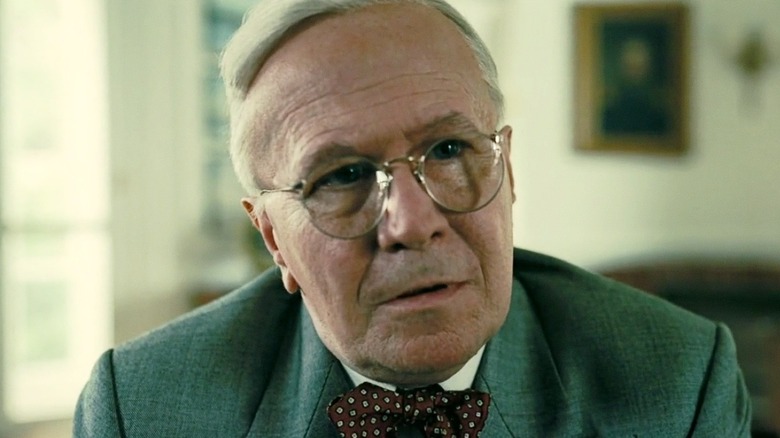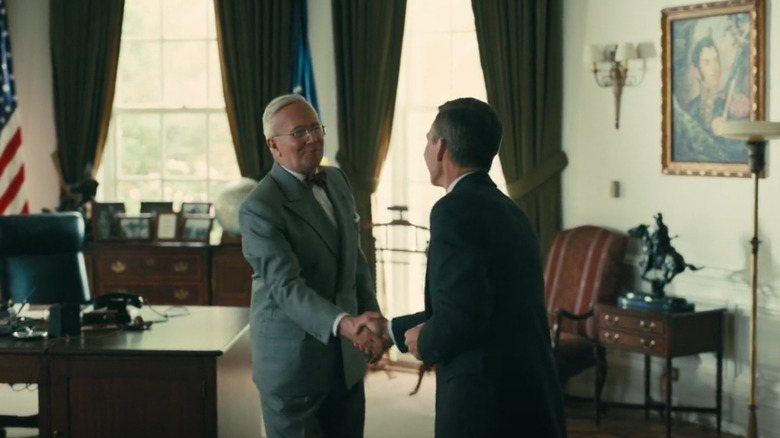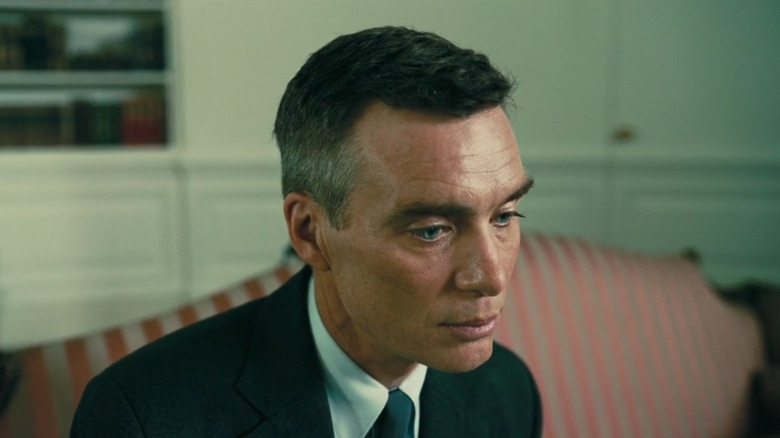Christopher Nolan Explains Oppenheimer's 'Crybaby' Scene With President Truman
We may receive a commission on purchases made from links.
There are a lot of devastating scenes in "Oppenheimer," which makes sense considering how often it asks us to contemplate the likelihood that we'll all die in a string of nuclear explosions. It's a heavy movie with some heavy themes, particularly for its American audience. Not only do we have to watch our government officials make the cold decision to drop bombs on two civilian-heavy Japanese cities — neither of them Kyoto of course, because that's where one general went on his honeymoon — but we also have to watch this government's apparent lack of guilt over the decision. Cillian Murphy's J. Robert Oppenheimer is one of the only people who seems to seriously reckon with the devastation he's unleashed upon the world, and it's only when he gets to meet President Truman after the war that he realizes just how alone in his guilt he truly is.
"I feel I have blood on my hands," he says, and Truman (played by a nearly-unrecognizable Gary Oldman) responds by playfully offering him a tissue. "You think anyone in Hiroshima, or ... Nagasaki, gives a s**t who built the bomb? They care who dropped it. I did. Hiroshima isn't about you." Then as Oppenheimer's leaving the room we hear Truman telling his aide, "Don't let that crybaby back in here."
It's a dark moment not just for Oppenheimer, as he's realizing how little influence he truly has over how the government will be using his creation, but for us. Truman might not be most modern Americans' favorite president, but this meaner, unfiltered version of him is still rare to see. When we look back at America's questionable use of the atomic bombs during World War II, we'd sure like to think President Truman would've acted a bit more compassionately in the aftermath.
In defense of Truman...
But as Director Christopher Nolan's explained in a new book about the film, "Unleashing Oppenheimer: Inside Christopher Nolan's Explosive Atomic-Age Thriller," this scene isn't really about Truman being a jerk. The scene is more about a miscommunication; Truman was expecting one thing, Oppenheimer came in expecting another. The result is an awkward scene that plays out like one of the many painful misunderstandings on "The Office," except with a lot more existential dread.
"[Oppenheimer]'s thinking that he's now gained access to the highest corridors of power and he's going to be sounding out his opinion about the moral and ethical complexities of what they've done," Nolan explained, "and I think from Truman's point of view, it was a much more superficial congratulatory meeting about 'Thank you for your effort during the war. We'll take it from here!'" Maybe there was a version of this meeting where Truman handled things more thoughtfully, but these were simply not circumstances that would invoke from him an earnest, vulnerable conversation about the ramifications of what he's done.
Truman's harsh reaction also helps to underline one of the biggest questions of the movie, which is about just how self-serving Oppenheimer's guilt is. "You don't get to commit the sin and then have us all feel sorry for you that it had consequences," Oppenheimer's wife Kitty says earlier in the film, and the line is echoed again here in Truman's response. It's basically his way of saying, "Sorry Oppie, but you can't spend years working to build an atomic bomb and then act all sad and guilty when it's used for its intended purpose." Lewis Strauss (Robert Downey Jr.) later asserts that Oppenheimer wants to be a martyr, and this scene's a strong piece of evidence in that argument's favor.
In defense of Oppenheimer...
But call Oppenheimer a wannabe martyr all you want, the fact remains that Oppenheimer shifted his approach almost immediately after this meeting. Both in real life and in the film, this was the point where Oppenheimer went all in on politics, using his fame and prestige to try to influence America's nuclear policies instead of just making moral, ethical arguments. Although we all know now how Oppenheimer's career almost entirely imploded in the 1954 hearings, at least he spent that near-decade beforehand pushing as hard as he could to de-escalate the nuclear arms race. Did he succeed as much as most of us would've liked? Of course not, but he still made it further than his early appeals to the government's humanity ever would've gotten him.
How would things have played out if Truman and Oppenheimer's initial meeting had played out a little smoother? We'll never know for sure. All we know is that it made for a fascinating movie scene, one both actors involved hit out of the park. "I think Cillian and Gary are able to project something that's very difficult to get on film, which is misunderstanding," Nolan explained. "It's not the misunderstanding of a French farce, but the misunderstanding of mood and tone that happens so often in real life." Of course, in the world Oppenheimer's created, the consequences of a misunderstanding like this can now be far, far higher than they'd ever been before.


